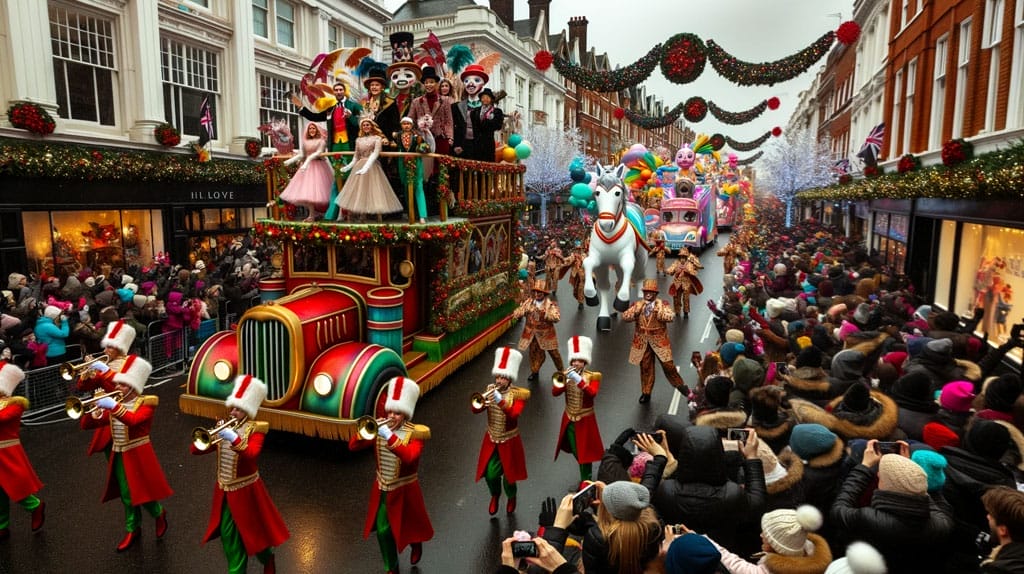Boxing Day Origin, History and Traditions Revealed

Quick Summary
- Boxing Day is a holiday celebrated on December 26th, the day after Christmas.
- It originated in Great Britain and is observed in countries that were part of the British Empire.
- The exact origin of the term “Boxing Day” is uncertain, but it is associated with charitable giving.
- Boxing Day is traditionally associated with outdoor activities like hunting, horseracing, and football matches.
- In recent years, Boxing Day has also become known for its shopping sales.
- It became an official bank holiday in the United Kingdom in 1871.
- Boxing Day is celebrated in several former British colonies, including Canada, Australia, Nigeria, South Africa, and Trinidad and Tobago.
Boxing Day Origins
Boxing Day is a holiday celebrated on the day following Christmas Day, which is December 26th. It originated in Great Britain and is also observed in several countries that were part of the British Empire. It became an official bank holiday in the United Kingdom in 1871 and is celebrated in many former British colonies, including Canada, Australia, Nigeria, South Africa, and Trinidad and Tobago.
The exact origin of the term “Boxing Day” is uncertain, but it is believed to be connected to charitable giving and the collection of donations for the poor. The holiday is associated with outdoor activities, such as hunting, horseracing, and football matches.
The exact origin of the term “Boxing Day” is uncertain, but it is believed to be connected to charitable giving and the collection of donations for the poor. One theory suggests that it originated from the practice of giving boxes filled with gifts to servants, tradespeople, and the less fortunate on the day after Christmas. This gesture was seen as a way to show gratitude and provide assistance to those in need during the holiday season.
Another theory links Boxing Day to the tradition of almsgiving, where churches would collect donations in boxes placed near the altar. These donations would then be distributed to the poor and needy. This act of charity and giving was deeply ingrained in the spirit of Christmas, and Boxing Day became an extension of this tradition.
The Role of Victorian England
Victorian Christmas traditions played a crucial role in popularizing Boxing Day and shaping it into the holiday we know today. The Victorians, known for their love of grandeur and spectacle, started the tradition of Boxing Day parades. These vibrant displays, coupled with the exchange of Christmas leftovers in boxes, gave rise to the unique name and customs of this festive holiday.
Moreover, Victorian England introduced the concept of Boxing Day sales. They saw it as an opportunity for the working class to reap discounts and enjoy festive season shopping after Christmas. This tradition has remained a staple ever since, with contemporary Boxing Day sales drawing crowds similar to those of Black Friday.
The Victorians also used Boxing Day as a chance to give back to society. They’d donate to the less fortunate, often in boxes filled with money or goods. This charitable aspect of Boxing Day is still prominent today.
Feast of St. Stephen
St. Stephen, recognized as the first Christian martyr, holds a special place in history for his acts of charity and benevolence. His legacy is commemorated on his feast day, which falls on December 26th.
Over time, the reverence for St. Stephen’s deeds intertwined with the age-old practice of distributing Christmas boxes filled with gifts or money to servants and those less fortunate. This act of giving during the festive season became synonymous with the spirit of St. Stephen’s Day, a testament to the enduring impact of his charitable endeavors.
This connection to St. Stephen’s Day underscores the importance of giving during the holiday season. So, you see, Boxing Day and St. Stephen’s Day, while different in origin, share a common spirit of generosity and celebration.
Another fascinating facet of Boxing Day traditions is the Feast of St. Stephen, often referred to as the ‘Day of the Wren.’ Rooted deep in ancient Irish customs, this tradition revolves around the hunting and showcasing of a wren, a bird symbolizing good fortune. The ritual is believed to attract prosperity and positive vibes for the forthcoming year.
During the ‘Day of the Wren’, communities come alive with festive fervor. Participants adorn themselves in vibrant traditional costumes and engage in melodious singing. Carrying the emblematic wren, they journey from one household to another, spreading joy and festivity. As they make their way, they gather contributions, which are later donated to charitable causes. This melding of cultural celebration with acts of benevolence beautifully encapsulates the true essence of Boxing Day and the teachings of St. Stephen.
The Tradition of Christmas Boxes
Building on the theme of giving, you’ll find that the tradition of Christmas boxes, which is integral to the celebration of Boxing Day, takes this spirit of generosity a step further. In the past, servants, tradesmen, and postmen received these boxes as thanks for good service throughout the year.
In Victorian days, the giving of Christmas boxes to servants is a long-standing tradition associated with Boxing Day. Employers would present their household staff with boxes filled with small gifts, money, or leftovers from the Christmas feast as a token of appreciation for their hard work. This tradition extended to other acts of charity, as people would collect donations and distribute them to the less fortunate.
Even today, the spirit of charity remains strong on Boxing Day. Many individuals and organizations continue the practice of almsgiving, donating to various causes and providing assistance to those in need. This tradition serves as a reminder of the importance of compassion and giving during the holiday season.
Boxing Day in Other Countries
Boxing Day, which originated in Britain, has seen its influence stretch across the globe, predominantly in nations that were once part of the British Empire. Countries such as Canada, Australia, New Zealand, and South Africa have adopted this holiday, integrating it into their own festive calendars.
The spread can be attributed to the legacy of the British colonial era, where traditions, customs, and holidays were introduced and often became ingrained in the local cultures. Furthermore, the universal appeal of a holiday that emphasizes charity, goodwill, and family bonding resonated with many, making it a natural fit for societies that valued these principles.
In the United Kingdom, Boxing Day is a public holiday that is known for its sporting events and family gatherings. One popular tradition is the Boxing Day Sales, where retailers offer significant discounts and shoppers take advantage of post-Christmas bargains. It is also a day for outdoor activities, such as football matches and fox hunting. Families often come together for festive meals and exchange gifts.
Canadian Boxing Day traditions are similar to those in the UK. Many Canadians participate in Boxing Day shopping, trying to score deals and discounts on various items. The day is also marked by sports events, especially ice hockey matches, and community parades. Families may gather for meals and exchange gifts, continuing the Christmas celebrations.
Boxing Day in Australia is a time for relaxation and outdoor activities. Many Australians head to the beach for a day of swimming, surfing, and picnics. The popular Sydney to Hobart Yacht Race also begins on Boxing Day, attracting participants and spectators from around the world. Families often enjoy barbecues and spend quality time together.
Over time, as global connectivity grew, the exchange of cultural practices further propelled the recognition and observance of Boxing Day in regions even beyond the confines of the former British territories.
Boxing Day Activities
Boxing Day holds a cherished tradition for many families in the UK: gathering around the television to watch Premier League football. As the aroma of leftover Christmas dinner wafts through the home, family members of all ages come together, donning their team’s colors, to cheer on their favorite clubs.

This communal viewing becomes more than just a game; it’s a bonding experience. Animated discussions about team strategies, playful banter between relatives supporting rival teams, and shared moments of triumph or disappointment make these gatherings memorable. Amidst the festive ambiance, watching Premier League football serves as a cherished pastime, encapsulating the warmth and camaraderie of the holiday season.
Boxing Day is known for its outdoor activities, providing opportunities for sports enthusiasts and spectators to engage in various events. One popular activity on this day is fox hunting, a traditional sport that dates back centuries in the United Kingdom. Participants, mounted on horses, follow a pack of hounds as they chase a fox across the countryside. Although controversial, with restrictions in place to protect wildlife, fox hunting remains a significant part of Boxing Day traditions.
Another outdoor activity associated with Boxing Day is horseracing. This thrilling sport attracts a large crowd, with prestigious races taking place at renowned tracks such as Kempton Park and Wetherby. Many racing enthusiasts eagerly anticipate Boxing Day to witness top-class horses competing for glory.

For cricket fans, Boxing Day also marks the start of one of the most prestigious test matches of the year. The Melbourne Cricket Ground in Australia hosts the Boxing Day Test, where the national team takes on a visiting side. This five-day match is a highlight of the cricket calendar and draws thousands of spectators.
The Evolution of Boxing Day Sales
In recent years, Boxing Day has become synonymous with shopping sales and discounts, attracting throngs of eager shoppers looking for bargains. The tradition of Boxing Day sales has evolved over time, transforming the day after Christmas into a major shopping event. Retailers offer significant discounts and promotions, enticing customers to take advantage of post-holiday deals.
Stores and online retailers alike participate in Boxing Day sales, with many opening their doors early to accommodate eager shoppers. Online shopping has surged in popularity, allowing customers to conveniently browse and purchase items from the comfort of their own homes. This has also led to the emergence of Cyber Monday as a complementary shopping event.

The popularity of Boxing Day sales has not only transformed the post-Christmas shopping experience but has also had a significant impact on the economy. Retailers aim to boost their year-end sales and clear out excess inventory, while consumers take advantage of the discounted prices to fulfill their shopping desires.
However, the popularity of online shopping has also transformed the Boxing Day sales landscape. E-commerce platforms now offer exclusive deals and discounts, allowing shoppers to conveniently browse and purchase from the comfort of their homes. This digital shift has opened up new opportunities for those who prefer to avoid the crowds and long queues associated with traditional brick-and-mortar stores.
This surge in spending stimulates economic growth and contributes to the overall festive season shopping atmosphere.
Boxing Day Charity and Almsgiving
Boxing Day has long been associated with acts of charity and almsgiving, with individuals and communities coming together to support those in need. The holiday, which originated in Great Britain and is now observed in various countries, carries a spirit of generosity that pervades the festive season. One of the enduring traditions of Boxing Day is the giving of Christmas charity boxes, which are filled with donations and distributed to those less fortunate.
These Christmas charity boxes serve as a symbol of goodwill and compassion, providing a tangible way for people to express their care and concern for others. They are often filled with food, clothing, and other essential items, as well as monetary contributions. The act of giving these boxes not only brings joy to the recipients but also fosters a sense of unity and community spirit.
Almsgiving is another important aspect of Boxing Day, reflecting the holiday’s historical link to helping the poor. Throughout history, individuals and organizations have engaged in acts of charity on this day, providing assistance to those in need. Whether through monetary donations, volunteering time, or offering support and comfort, the spirit of almsgiving on Boxing Day continues to touch the lives of many.
Charitable Organizations and Initiatives
Various charitable organizations and initiatives play a significant role in facilitating the charitable efforts of Boxing Day. These organizations work tirelessly to collect and distribute donations, ensuring that they reach those who need them most.
They collaborate with volunteers, businesses, and local communities to maximize the impact of their efforts, working towards a shared goal of making a positive difference in the lives of others.
| Charitable Organizations | Initiatives |
|---|---|
| Red Cross | Emergency relief efforts, healthcare services, blood donation drives |
| Salvation Army | Homeless shelters, food banks, support for vulnerable populations |
| Local Community Centers | Organizing community events, distributing Christmas charity boxes, supporting local families in need |
These organizations rely on the generosity of individuals and communities to sustain their important work. Boxing Day presents an opportunity for everyone to contribute to these initiatives, whether through donations, volunteering, or spreading awareness about the importance of giving back.
Boxing Day Parades and Festivities
Boxing Day is often marked by lively parades and festivities, bringing communities together in a joyous display of merriment. People gather along the streets, eagerly awaiting the start of the procession, as floats adorned with colorful decorations and performers in vibrant costumes pass by. The air is filled with excitement and laughter, creating an electric atmosphere that captivates both young and old.

The parades on Boxing Day showcase the rich cultural heritage of different regions, with each procession reflecting the unique traditions and customs of the community. Marching bands set the rhythm, playing cheerful tunes that resonate through the streets, as dancers and acrobats mesmerize onlookers with their impressive performances. Local schools, organizations, and community groups also participate, proudly displaying their achievements and talents.
As the procession winds its way through the town, spectators are treated to a visual feast of creativity and artistry. Elaborate floats depict scenes from folklore, historical events, or celebrations specific to the region. Spectacular costumes dazzle the eye, while street performers entertain with their skills and tricks. The parades truly embody the spirit of togetherness and celebration, uniting people in their shared joy.
| Countries Celebrating Boxing Day | Parade Details |
|---|---|
| United Kingdom | The most famous parade is the London’s New Year’s Day Parade, held on January 1st every year. |
| Canada | The Toronto Santa Claus Parade is a beloved tradition dating back to 1905, attracting huge crowds and featuring a wide range of floats and performers. |
| Australia | The Sydney Festival, an annual arts and cultural event, offers a vibrant parade featuring elaborate floats, street performances, and live music. |
FAQ
What is Boxing Day?
Boxing Day is a holiday celebrated on the day following Christmas Day, which is December 26th. It originated in Great Britain and is also observed in several countries that were part of the British Empire.
Where did the term “Boxing Day” come from?
The exact origin of the term “Boxing Day” is uncertain, but it is believed to be connected to charitable giving and the collection of donations for the poor.
What are some Boxing Day traditions?
Boxing Day is associated with outdoor activities, such as hunting, horseracing, and football matches. It is also known for its shopping sales in recent years.
Which countries celebrate Boxing Day?
Boxing Day is celebrated in many countries that were part of the British Empire, including Canada, Australia, Nigeria, South Africa, and Trinidad and Tobago.




